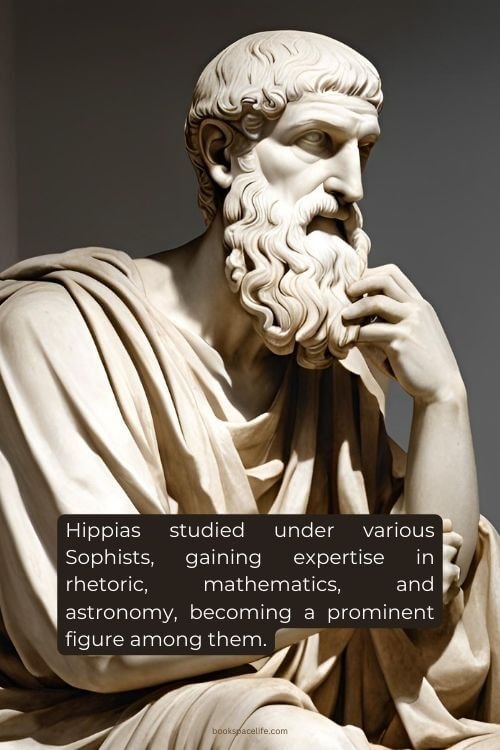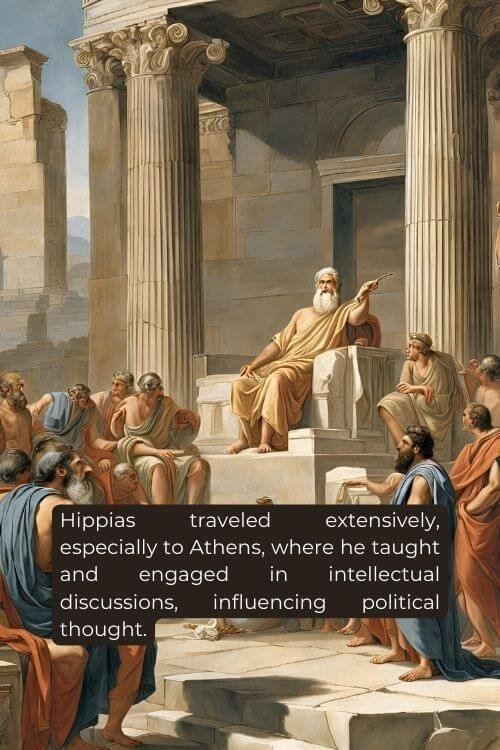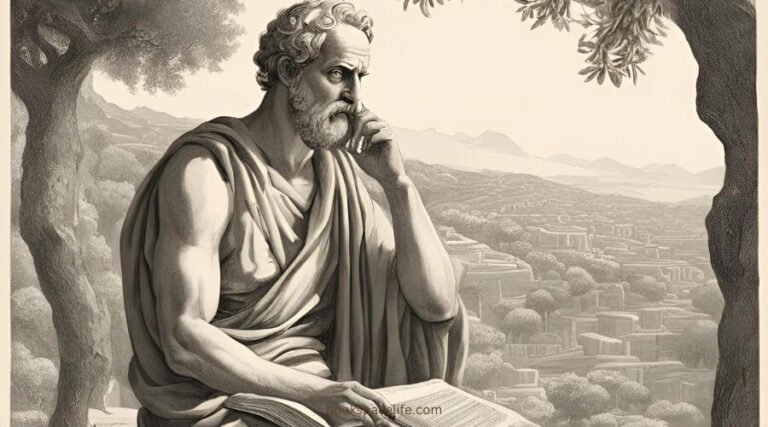Thales of Miletus
Hippias of Elis: The Versatile Sophist of Ancient Greece
Hippias of Elis (460 – 400 BCE) was a prominent figure in ancient Greek philosophy, known for his wide-ranging knowledge and contributions to various fields, including ethics, rhetoric, and mathematics.
As a member of the Sophistic movement, Hippias played a significant role in the intellectual landscape of ancient Greece, advocating for the importance of education and the pursuit of knowledge.
This blog post will explore Hippias’s life, early education, travels, philosophical ideas, and his lasting influence on philosophy and education.
Quick Read
Table of Contents
(1) Early Life and Education
Hippias was born in Elis, a region in the western part of the Peloponnese. Details about his early life are sparse, but it is believed he came from a well-off family, which afforded him the opportunity to pursue education in a variety of fields.
Hippias is said to have been a prodigy in his youth, displaying an aptitude for learning that would set the stage for his later contributions to philosophy and education.
While specific records of his formal education are lacking, it is likely that Hippias studied under various sophists and philosophers of his time, engaging with the intellectual currents of ancient Greece.
The Sophists, known for their rhetorical skills and relativistic approach to truth, profoundly influenced Hippias’s thinking.
Unlike many contemporaneous philosophers who focused on metaphysics and cosmology, Hippias’s interests spanned a multitude of disciplines, allowing him to develop a unique and comprehensive perspective on human knowledge and society.

(2) Travels and Influence
Hippias was known for his extensive travels throughout Greece and beyond. His journeys were not merely for pleasure; they were also educational, allowing him to interact with diverse cultures and ideas.
He traveled to major cities, including Athens and Sicily, where he engaged with prominent thinkers and contributed to the intellectual discourse of the time.
These travels enriched his understanding of various subjects and enhanced his reputation as a polymath.
Hippias is said to have participated in public competitions, showcasing his talents in poetry, music, and rhetoric.
His ability to engage with a wide array of topics made him a sought-after figure in educational circles, and he became known for his public lectures and demonstrations.
(3) Philosophical Contributions
Hippias’s philosophy is characterized by several key themes and ideas:
- Relativism and Truth: As a Sophist, Hippias was influenced by the notion of relativism, which posits that truth is not absolute but can vary depending on perspective. He challenged conventional notions of truth and morality, arguing that different societies and cultures possess different standards and beliefs. This relativistic perspective was foundational to the Sophistic movement and highlighted the complexity of human experience.
Hippias’s belief in the variability of truth suggests that he recognized the importance of context in understanding ethical and moral principles.
This stance paved the way for future philosophical debates about the nature of truth and morality, influencing later thinkers such as Protagoras and even Socrates, who grappled with the implications of relativism in their own works.
- Education and Knowledge: Hippias was a strong advocate for education and the pursuit of knowledge. He believed that knowledge was essential for individuals to navigate the complexities of life and make informed decisions. His teachings emphasized the importance of a broad education that encompassed various disciplines, including philosophy, mathematics, rhetoric, and the arts.
He sought to democratize education by making it accessible to a wider audience, challenging the exclusivity of philosophical knowledge held by a select few.
Hippias’s approach to education reflects the Sophistic belief that knowledge should empower individuals to engage effectively in public life and discourse.
- Mathematics and Geometry: Hippias is often credited with contributions to mathematics and geometry. He is known for his work on geometric constructions, particularly the concept of the quadratrix, a curve used to solve problems related to angle trisection and the quadrature of the circle. His interest in mathematical concepts illustrates the interconnectedness of philosophy and science in ancient Greece.
Hippias’s contributions to mathematics demonstrate his belief in the value of rigorous inquiry and logical reasoning.
His work laid the groundwork for later developments in geometry, influencing mathematicians such as Euclid and Archimedes, who built upon the ideas of earlier thinkers.
- Rhetoric and Persuasion: As a Sophist, Hippias was also deeply interested in rhetoric and the art of persuasion. He believed that effective communication was crucial for success in public life and that individuals should be trained in the techniques of rhetoric to articulate their ideas persuasively.
Hippias’s teachings on rhetoric emphasized the importance of understanding one’s audience and employing various rhetorical devices to convey messages effectively.
His contributions to the field of rhetoric influenced subsequent generations of speakers and writers, shaping the art of persuasion in Western culture.
- Ethics and Moral Philosophy: Hippias’s views on ethics were rooted in his relativistic perspective. He argued that moral principles are not universally applicable but are instead shaped by cultural and societal norms. This view challenged the notion of absolute morality and raised questions about the nature of right and wrong.
While Hippias’s relativism has been criticized for undermining moral standards, it also prompted important discussions about the role of culture and context in ethical decision-making.
His ideas laid the groundwork for later ethical theories, including utilitarianism and moral relativism, which continue to be debated in contemporary philosophy.

(4) Influence and Impact
Hippias’s contributions to philosophy, education, and rhetoric have had a lasting impact on subsequent generations of thinkers:
- Influence on Later Sophists: As a prominent figure in the Sophistic movement, Hippias’s ideas influenced other Sophists, including Protagoras and Gorgias. His relativistic perspective and emphasis on the importance of education and rhetoric became central tenets of Sophistic thought, shaping the course of philosophical discourse in ancient Greece.
The Sophists’ legacy is reflected in the development of humanistic philosophy and education, which prioritize individual experience and cultural context in understanding knowledge and ethics.
Hippias’s teachings contributed to the broader movement that sought to challenge traditional beliefs and encourage critical inquiry.
- Impact on Socratic Philosophy: Hippias’s relativistic views presented a counterpoint to the ethical inquiries of Socrates, who sought to establish absolute moral truths. The debates between Socratic thought and Sophistic relativism influenced the development of Western philosophy, prompting subsequent thinkers to grapple with the complexities of truth, knowledge, and ethics.
The tension between Hippias’s relativism and Socrates’s pursuit of objective truth laid the foundation for philosophical inquiries into ethics and morality that continue to resonate in contemporary discussions about the nature of truth and ethical standards.
- Legacy in Rhetoric and Education: Hippias’s emphasis on rhetoric and the art of persuasion has had a lasting impact on education and public discourse. His teachings on effective communication and the importance of critical thinking continue to inform modern educational practices, particularly in fields such as law, politics, and public speaking.
The principles of rhetoric that Hippias championed have influenced the development of communication studies and have become integral to the study of persuasive writing and speaking.
His legacy is evident in the ongoing exploration of the relationship between language, power, and society.
- Contributions to Mathematics and Science: Hippias’s work in mathematics and geometry laid the groundwork for future developments in these fields. His explorations of geometric constructions and the quadratrix contributed to the advancement of mathematical thought, influencing figures such as Euclid and Archimedes.
The interdisciplinary nature of Hippias’s work reflects the interconnectedness of philosophy and science in ancient Greece, illustrating the importance of rigorous inquiry in the pursuit of knowledge.
His contributions to mathematics exemplify the broader intellectual traditions of ancient Greece that sought to understand the natural world through reason and observation.
- Cultural Impact: Hippias’s life and work contributed to the cultural milieu of ancient Greece, reflecting the vibrant intellectual atmosphere of the time. His commitment to education, knowledge, and the exploration of diverse ideas resonated with the values of Athenian democracy, where public discourse and debate were central to civic life.
The legacy of Hippias as a thinker who challenged conventional wisdom and sought to democratize knowledge continues to inspire individuals seeking to engage critically with the world around them.
His life serves as a testament to the enduring power of philosophy to foster intellectual curiosity and ethical reflection.
(5) Conclusion
Hippias of Elis remains a significant figure in the history of philosophy, known for his contributions to ethics, rhetoric, mathematics, and education. His emphasis on relativism, critical inquiry, and the importance of knowledge laid the foundation for subsequent philosophical discussions and developments.
As a member of the Sophistic movement, Hippias challenged traditional notions of truth and morality, prompting important debates about the nature of knowledge and ethics that continue to resonate in contemporary discourse.
His legacy as a polymath and advocate for education serves as an enduring reminder of the value of intellectual exploration and the pursuit of knowledge in shaping a just and informed society.
In a world increasingly characterized by complexity and diversity, Hippias’s insights into the relativity of truth and the importance of education remain relevant, inspiring individuals to engage critically with their beliefs and the world around them.
His life and philosophy encourage us to pursue knowledge, embrace diversity, and engage in meaningful dialogue, fostering a deeper understanding of ourselves and the complexities of human experience.
(A) 7 Quick Facts on Hippias of Elis
- Date of Birth – Hippias was born around 460 BCE, during the height of Greek philosophical thought and the Sophistic movement.
- Place of Birth – He was born in Elis, a region in the Peloponnese, known for the Olympic Games.
- Early Education – Hippias studied under various Sophists, gaining expertise in rhetoric, mathematics, and astronomy, becoming a prominent figure among them.
- Travel to Athens – He traveled extensively, especially to Athens, where he taught and engaged in intellectual discussions, influencing political thought.
- Multiple Disciplines – Hippias was a polymath, contributing to fields such as philosophy, poetry, and mathematics, emphasizing the interconnectedness of knowledge.
- Public Debater – He participated in public debates, showcasing his rhetorical skills and arguing on behalf of various political and philosophical ideas.
- Legacy – Hippias is remembered as a key figure in the Sophistic movement, influencing later philosophers and educators in the art of persuasion.
(B) 10 Quotes attributed to Hippias of Elis
- The greatest good is to know oneself. Emphasizing self-knowledge as the foundation of wisdom.
- What is just is not the same for all. Highlighting the subjective nature of justice and morality.
- To be wise is to be able to speak well. Asserting the importance of eloquence in demonstrating knowledge.
- The same things are both just and unjust. Suggesting that perceptions of justice can vary based on context and viewpoint.
- A single man cannot have the truth. Indicating that truth may be multifaceted and not solely owned by one individual.
- Knowledge is the root of all virtue. Stressing that understanding and knowledge are essential to ethical behavior.
- Those who are wise can navigate the complexities of life. Pointing to the practical benefits of wisdom in daily life.
- True beauty exists in the harmony of the whole. Reflecting on aesthetics and the importance of balance.
- Words can shape reality; they are powerful tools. Acknowledging the influence of language in constructing our perceptions.
- A good life is a life lived in accordance with virtue. Defining the good life in terms of ethical living and moral integrity.








